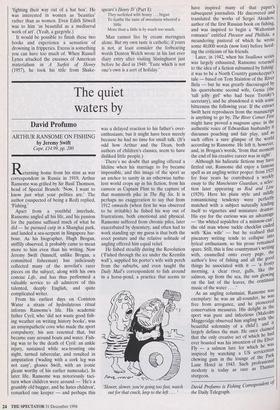The quiet waters by
David Profumo
ARTHUR RANSOME ON FISHING by Jeremy Swift Cape, £14.99, pp. 280 Returning home from his stint as war correspondent in Russia in 1919, Arthur Ransome was grilled by Sir Basil Thomson, head of Special Branch: Now, I want to know just what your politics are.' The author (suspected of being a Red) replied, `Fishing.'
Apart from a youthful interlude, Ransome angled all his life, and his passion for the pastime suffused much of what he did — he pursued carp in a Shanghai park, and landed a sea-serpent in Singapore har- bour. As his biographer, Hugh Brogan, sniffily observed, it probably came to mean more to him even than his writing. Now Jeremy Swift (himself, unlike Brogan, a committed fisherman) has judiciously collected many of the novelist's rarer pieces on the subject, along with his own concise Life, and has thus performed a valuable service to all admirers of this talented, deeply English, and quite complicated writer.
From his earliest days on Coniston Water a strain of hydrolatrous ritual informs Ransome's life. His academic father Cyril, who 'did not waste good fish- ing weather on writing history books', was an unsympathetic cove who made the sport compulsory; his son resented that, but became easy around boats and water. Fish- ing was to be the death of Cyril: an ankle injury, sustained while sea-trouting one night, turned tubercular, and resulted in amputation (`wading with a cork leg was not easy', glosses Swift, with an ironic gleam worthy of his earlier namesake). In later life, Ransome was notoriously taci- turn when children were around — `He's a grumbly old-bugger, and he hates children', remarked one keeper — and perhaps this was a delayed reaction to his father's over- enthusiasm, but it might have been merely because he had no time for small talk. (It's odd how Arthur and the Dean, both authors of children's classics, seem to have disliked little people.) There's no doubt that angling offered a lifeline when his marriage to Ivy became impossible, and this image of the sport as an anchor to sanity in an otherwise turbu- lent world crops up in his fiction, from his cameos as Captain Flint to the capture of that mammoth pike in The Big Six. It is perhaps no exaggeration to say that from 1912 onwards (when first he was observed to be irritable) he fished his way out of frustrations, both emotional and physical. Ransome suffered from chronic piles, later exacerbated by dysentery, and often had to work standing up: my guess is that both the erect posture and the relative solitude of angling offered him equal relief.
He fished steadily during the Revolution (`Fished through the ice under the Kremlin wall'), supplied his porter's wife with perch from the suburbs, and even taught the Daily Mail's correspondent to fish around in a horse-pond, a practice that seems to Slower, slower, you're going too fast, watch out for that crack, leep to the left . . . ' have inspired many of that paper's subsequent journalists. He discovered and translated the works of Sergei Alcsakov, author of the first Russian book on fishing, and was inspired to begin a Waltonian romance' entitled Piscator and Phillida, a meandering pastoral of which he wrote some 40,000 words (now lost) before heed- ing the criticism of his friends. Later, in 1942, when his Swallows series was largely exhausted, Ransome returned to the idea of a fiction subsumed by fishing: it was to be a North Country gamekeeper's tale — based on Tom Stainton of the River Bela — but he was greatly discouraged by his quarrelsome second wife, Genia (the `tall jolly girl' who had been Trotsky's secretary), and he abandoned it with some bitterness the following year. If the extract Swift here reproduces from the manuscript is anything to go by, The River Comes First might have proved a magnum opus: in the authentic voice of Edwardian husbandry it discusses poaching and fair play, and as such offers a sure glimpse of the world according to Ransome. He left it, however, and, in Brogan's words, 'from that moment the end of his creative career was in sight'.
Although his halieutic fictions may have fizzled out, Ransome did enjoy a famous spell as an angling writer proper: from 1925 for four years he contributed a weekly essay to the Manchester Guardian, a selec- tion later appearing as Rod and Line (1929). Here his plain style and mildly romanticising tendency were P matched with a subject naturally lending itself to vignettes and miniature dramas. His eye for the curious was an advantage ? — `the whited sepulchre of a minnow-eau ; the old man whose tackle checklist ended with 'Kiss wife' — but he realised that piscatory writing tends to collapse into lyrical enthusiasm, so his prose remained spare. Still, this is fine countryman's writing with, enamelled onto every page, the author's love of fishing and all the good things he associated with it — frosty morning, a clear river, gulls, like the salmon, up from the sea, the sun glowing, on the last of the leaves, the continual music of the water As an angling columnist, Ransome was exemplary: he was an all-rounder, he was. free from arrogance, and he pioneered conservation measures. His delight in the sport was pure and infectious (Malcolm Muggeridge observed him angling with `the beautiful solemnity of a child'), and it • e largely defines the man. He once clad im . that the only creative act of which he had ever boasted was his invention of the Elver_ Fly — a salmon lure for which he was inspired by watching a US serviceman,_ chewing gum in the lounge of the parli, Lane Hotel in 1943. Such professional modesty is today as rare as Thames sturgeon. David Profumo is Fishing Correspondent of the Daily Telegraph.


























































 Previous page
Previous page